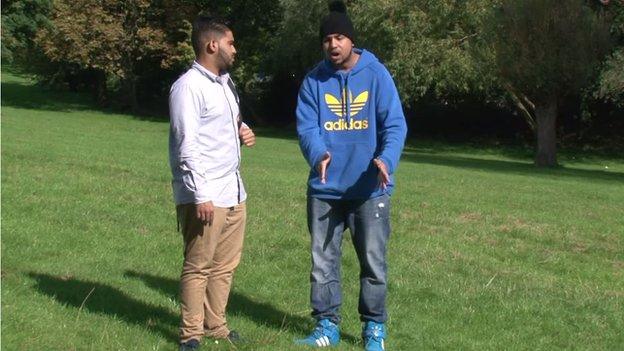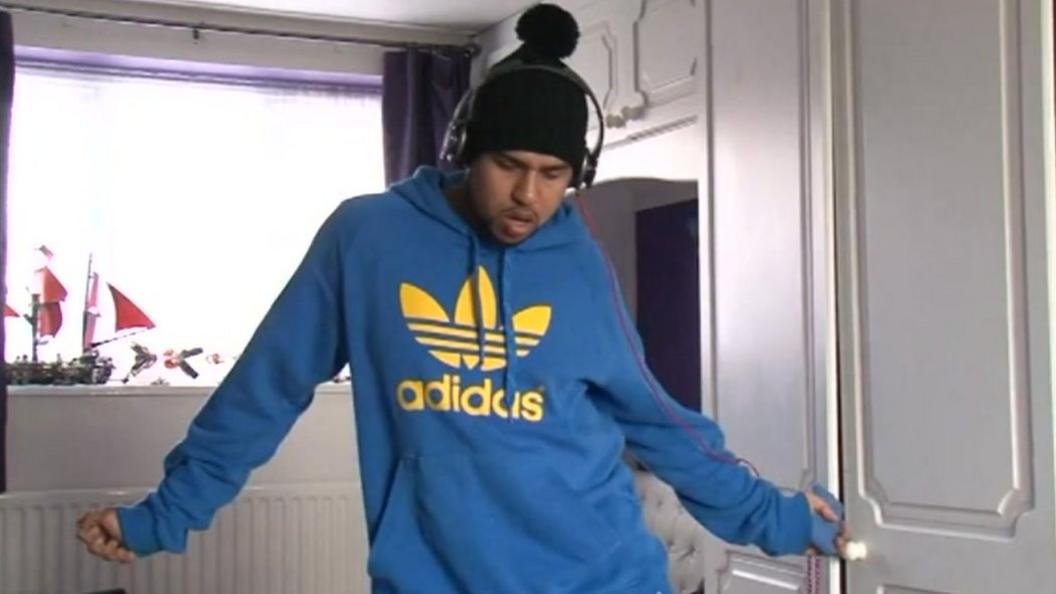Badman: Trying to prevent radicalisation with humour
- Published
Humza explains why he got involved
In an unlikely partnership, counter-terrorism police have teamed up with a Muslim comedian in an attempt to prevent British teenagers being radicalised by extremists.
At a secondary school in East London, a class of Year 9 students have had their English lesson on Shakespeare rescheduled.
It has been replaced with another man's work that most of the teenagers are much more familiar with.
The classroom is full of rowdy laughter, as the students watch a film starring Humza Arshad, better known as "Badman" to his fans.
The British Pakistani comedian, from south London, is a YouTube superstar - he has gained more than 40 million views for his Diary of a Badman comedy series.
The series explores a range of issues affecting young British Muslims, and each episode ends with a twist - there is a moral message, often inspired by the teachings of Islam.

The 15-minute film, called Think for Yourself, external, being shown to the pupils at George Green's School this morning, is a collaboration between the 29-year-old comedian and the police.
In one of the scenes, in a park, Arshad tries to stop his disillusioned cousin from being brainwashed by extremists using the teachings of Islam. "Brother, you're changing," he says. "Islam is about peace, if you want to stand up for something, then do so, but not with anger and violence."
The aim of the film is to educate students about the dangers of being groomed into extremist ideology. Arshad says he agreed to work with the police to do something constructive, using his popularity among young British Muslims.
'I'm a comedian, I'm not a politician. I'm just trying to do something positive. Muslims are portrayed in a negative light because of the actions of some extremists. It's really important for me, as a British Muslim, to step up and tell young people their actions are wrong."
The film is shown as part of anti-extremism lessons led by trained counter-terrorism officers. These lessons were first piloted in Leicester by the East Midlands Special Operations Unit's (EMSOU) Prevent team. They are now being rolled out to secondary schools across the UK.
It is hoped they might be able to prevent young British Muslims being radicalised and travelling to Syria to fight with Islamic State. Up to 500 British jihadists are thought to have joined the militant group.
The world of social media is often where extremists recruit and radicalise young people. Lessons like this are trying to counter the narrative of hate teenagers maybe exposed to.

More from the Magazine

Quilliam Foundation researcher and part-time imam Dr Usama Hasan asked what do radical Islamists actually believe in?
The BBC's Tara McKelvey looked at how those flying to Syria embarked on the path to jihad
In the wake of the Boston bombings, the BBC's Tim Franks looked at how easy it is for young men to become radicalised

The film goes down well with the students - like all of Arshad's videos, it makes them laugh, but also gets them thinking.
One student says: "I thought the film was influential because it tells you the right thing to do and stay away from terrorist organisations. It's a good way to teach us an important message in a comical way. I've learnt that if I notice people doing extreme things, I should act on it."
Another student explains: "Kids like me who watch Badman's stuff, think he's funny, he's normal, someone like us. So when he says something we understand it more. We are more influenced by him than if a police officer, imam or teacher tells us something."
The lessons have clearly given police a chance to engage with an audience they would otherwise struggle to connect with. The film sparks discussion about the dangers of terrorism between the police and pupils.
''What does a terrorist look like? Just like an ordinary person, they could look like just you and me, they don't have to be from any particular background, "
These are snippets of the conversation that follow the film. Under the government's new counter-terrorism bill, teachers will have a statutory duty to address extremism. It is impossible to know if lessons like this will prevent any young people from being radicalised.
Officer Rizwaan Chothia, of the EMSOU, who co-ordinated the project, says he is confident it's a step in the right direction.
"It's obviously difficult to measure the success of this project but we do hope that it will make a difference. We hope that by working with someone who has some credibility in the eyes of young people, we can try and tackle a key issue.
"Our aim is to create a safe space for debate and discussion, to get young people thinking about the dangers of radicalisation, indoctrination and extremism. We are not saying this is the only solution; this is part of a wider Prevent strategy aimed at preventing the radicalisation of young people."
Subscribe to the BBC News Magazine's email newsletter to get articles sent to your inbox.
- Published13 October 2014
